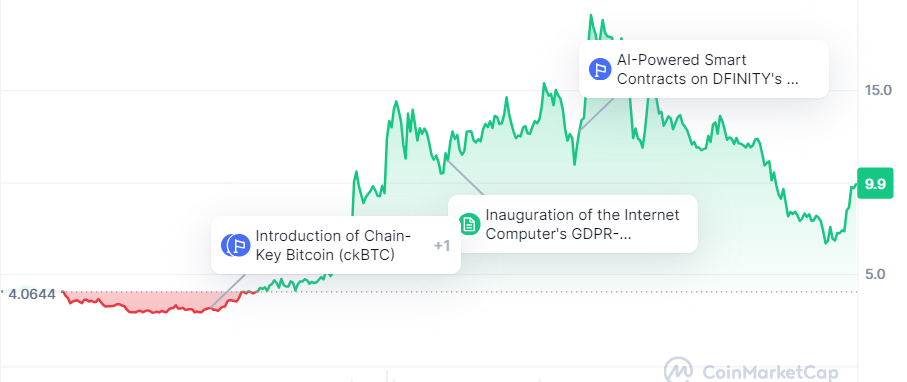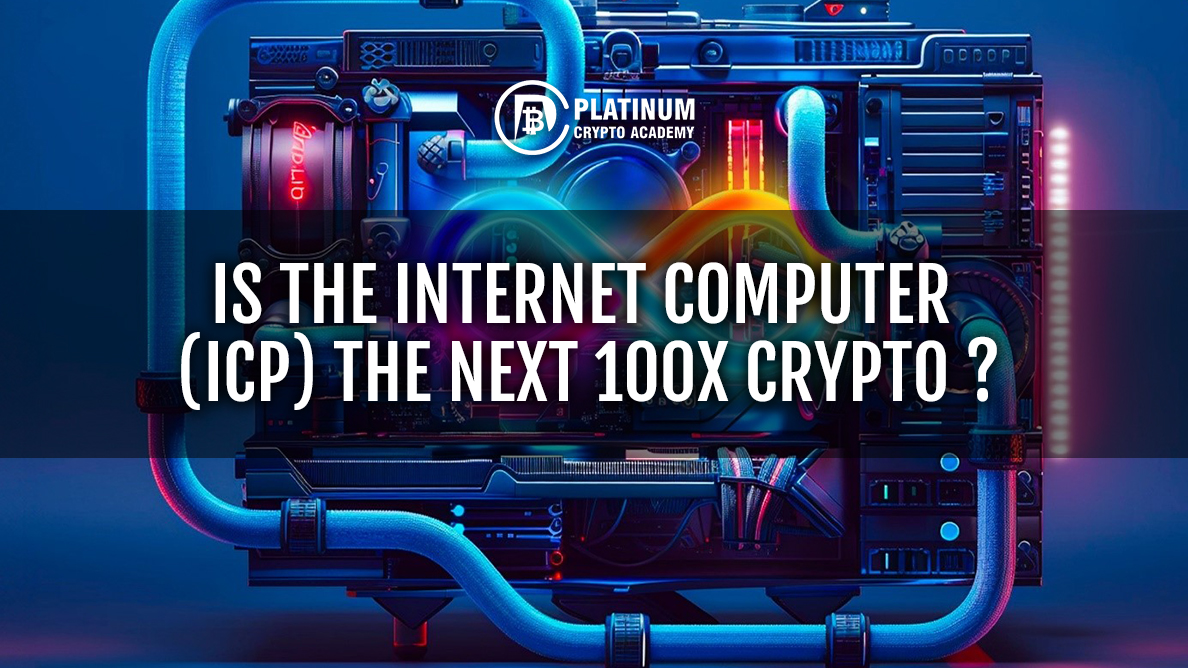Greetings, Cryptonaire Weekly audience! I’m Brian, one of your analysts, and today I want to dive into a project that has truly piqued my interest: The Internet Computer (ICP). It’s not just another blockchain project; it’s aiming to reinvent the internet itself.
Introduction to ICP
First, let’s get acquainted with what ICP is all about. The Internet Computer, developed by the DFINITY Foundation, is a revolutionary blockchain project that aims to transform the way we interact with the internet. Its mission is to extend the functionality of the internet, allowing it to host and run software in a fully decentralized manner. This ambitious goal sets it apart from the myriad of blockchain projects that have emerged in recent years.
The core idea behind ICP is to create a public network that can act as a decentralized cloud. This means that instead of relying on centralized servers owned by tech giants like Amazon, Google, and Microsoft, applications and services would run directly on the blockchain. This decentralized approach promises to enhance security, reduce costs, and increase the resilience of internet services.
Imagine a world where your social media platforms, financial services, and even AI applications are not controlled by a few large corporations but are instead distributed across a network of nodes managed by a decentralized community. This is the vision that ICP is working towards, and it’s a vision that could fundamentally change the internet as we know it.
The Evolution from Web 3 to Web 3.0
One of the key concepts driving ICP is the shift from Web 3 to Web 3.0. To understand this evolution, it’s essential to grasp the limitations of the current Web 3 landscape and how Web 3.0 aims to overcome them.
Picture this: you’re using a dApp for trading cryptocurrencies, and it feels revolutionary because it’s decentralized, right? But behind the scenes, the app’s data and computations are likely stored and processed on Amazon Web Services (AWS) or Google Cloud. This creates a paradox where the front-end appears decentralized, but the core infrastructure remains centralized. This hybrid model, while a step towards decentralization, falls short of the true potential of blockchain technology. For instance, let’s consider DeFi applications. These platforms promise decentralized financial services, yet they often depend on centralized cloud providers for hosting their databases and executing transactions. This reliance on centralized entities means they are still vulnerable to outages, cyber-attacks, and even censorship. Remember the AWS outage that took down numerous websites and services? That could just as easily disrupt your favourite DeFi platform.
This hybrid approach undermines the core principles of decentralization. Centralized services introduce points of failure and control that contradict the ethos of blockchain. Users and developers are still at the mercy of these centralized entities, which can change policies, raise costs, or shut down services with little to no warning. True ownership and control remain elusive in this model.
Web 3.0 Vision ICP
Enter Web 3.0, the vision championed by ICP. This represents a paradigm shift towards full-stack decentralization. Imagine a world where every layer of the application stack, from storage to computation, runs on decentralized networks. In this model, traditional cloud services are replaced entirely by blockchain technology, ensuring that no single entity controls the infrastructure.
With Web 3.0, the entire lifecycle of an application—development, deployment, and execution—occurs on the blockchain. This means that data storage, computation, and user interactions are all handled by decentralized networks of nodes. For example, a social media platform built on Web 3.0 would store all posts, likes, and user data on a decentralized network, making it impervious to data breaches and censorship. Imagine never having to worry about your data being sold or your account being arbitrarily suspended.
By removing the dependence on centralized services, Web 3.0 enhances the security and robustness of applications. Data breaches become nearly impossible because there is no single point of failure. Services remain operational even if some nodes go offline, ensuring uninterrupted access. Additionally, users gain greater control over their data and digital assets, aligning with the original ethos of decentralization.
Consider a decentralized finance (DeFi) platform on Web 3.0. Such a platform would not only facilitate peer-to-peer transactions without intermediaries but also store all transaction records on a decentralized ledger. This setup would be immune to hacks and fraud that plague centralized financial institutions. Users could trade, lend, and borrow with complete transparency and security.
The Vision and Challenges
The vision of ICP is monumental. It seeks to replace the current internet infrastructure with a decentralized alternative, providing better security, lower costs, and greater control for users and developers. This vision is not without its challenges, though. Competing with established tech giants is no small feat, and the adoption curve for such a revolutionary technology could be steep.
However, the potential benefits are immense. ICP’s approach could lead to a new era where internet services are more secure, resilient, and equitable. Imagine a world where your data is not controlled by a handful of corporations but by a decentralized network that ensures privacy and security by design.
Real-World Applications
ICP’s applications extend beyond just creating decentralized websites. It’s about enabling entire industries to operate on a decentralized cloud. For instance, in the realm of cybersecurity, ICP can inherently protect against hacks and data breaches due to its decentralized nature. In AI, it offers a platform where AI models and data can be hosted and run without relying on centralized entities, ensuring greater transparency and control.
Investment Potential
Now, let’s delve into the investment potential of ICP. The Internet Computer has been experiencing significant developments, and there are strong arguments for why this could be a lucrative investment.
ICP is currently priced at around $9.87, with a market cap of approximately $4.6 billion. Despite some concerns about its tokenomics and inflation rate, the project continues to build momentum with its technological advancements and strategic partnerships.

Technological Advancements: ICP’s technology is solid, with a transaction per second (TPS) rate around 4,800, and ongoing developments in cybersecurity through platforms like Utopia. Utopia is a private, serverless cloud infrastructure designed for government entities and enterprises, aiming to enhance cybersecurity resilience and IT productivity.
Strategic Partnerships: ICP is forming significant partnerships, such as its collaboration with the United Nations to launch a digital credentials pilot in Cambodia. This initiative aims to encourage micro, small, and medium enterprises to participate in the digital economy, showcasing ICP’s potential to impact global markets.
Ecosystem Growth: ICP is actively expanding its ecosystem with initiatives like the Web3 Labs Accelerator, which aims to bring high-quality projects into the ICP ecosystem. This accelerator provides financial aid, technical guidance, and marketing support to innovative web3 teams, further strengthening ICP’s position in the market.
Price Predictions: As ICP continues to develop and onboard new projects, its price potential looks promising. Some analysts predict that ICP could reach $80 to $100 in the next 12 to 18 months, offering a potential 10-12x return on investment. Long-term projections are even more optimistic, with the possibility of ICP reaching its previous all-time high of $700 if the network continues to grow and fulfil its vision.
Conclusion
As a Cryptonaire Weekly analyst, I believe that ICP holds significant promise. It’s not just another cryptocurrency; it’s a bold attempt to redefine the very fabric of the internet. While the project is still in its early stages, the groundwork laid by the DFINITY Foundation is impressive.
ICP could indeed be a transformative addition to any crypto portfolio, especially for those who believe in the potential of a truly decentralized internet. Keep an eye on this project, as it has the potential to become one of the most important innovations in the blockchain space.
Thanks for joining me on this exploration of the Internet Computer. Stay tuned for more insights and updates on this groundbreaking project. Until next time, keep exploring the exciting world of cryptocurrency!
Hopefully, you have enjoyed today’s article. Thanks for reading! Have a fantastic day! Live from the Platinum Crypto Trading Floor.
Earnings Disclaimer: The information you’ll find in this article is for educational purpose only. We make no promise or guarantee of income or earnings. You have to do some work, use your best judgement and perform due diligence before using the information in this article. Your success is still up to you. Nothing in this article is intended to be professional, legal, financial and/or accounting advice. Always seek competent advice from professionals in these matters. If you break the city or other local laws, we will not be held liable for any damages you incur.


